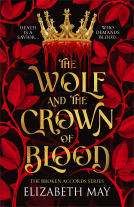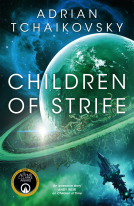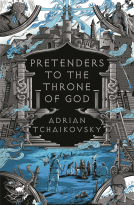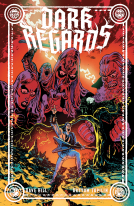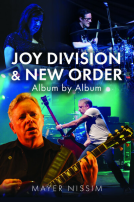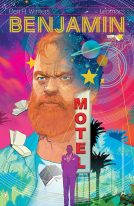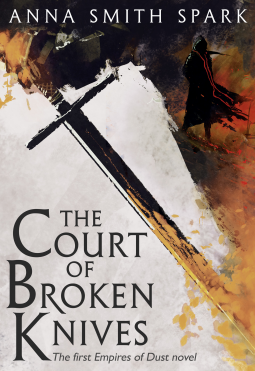
The Court of Broken Knives
by Anna Smith Spark
This title was previously available on NetGalley and is now archived.
Send NetGalley books directly to your Kindle or Kindle app
1
To read on a Kindle or Kindle app, please add kindle@netgalley.com as an approved email address to receive files in your Amazon account. Click here for step-by-step instructions.
2
Also find your Kindle email address within your Amazon account, and enter it here.
Pub Date 29 Jun 2017 | Archive Date 1 Apr 2022
HarperCollins UK, HarperFiction | HarperVoyager
Description
Perfect for fans of Mark Lawrence and R Scott Bakker, The Court of Broken Knives is the explosive debut by one of grimdark fantasy’s most exciting new voices.
They’ve finally looked at the graveyard of our Empire with open eyes. They’re fools and madmen and like the art of war. And their children go hungry while we piss gold and jewels into the dust.
In the richest empire the world has ever known, the city of Sorlost has always stood, eternal and unconquered. But in a city of dreams governed by an imposturous Emperor, decadence has become the true ruler, and has blinded its inhabitants to their vulnerability. The empire is on the verge of invasion – and only one man can see it.
Haunted by dreams of the empire’s demise, Orhan Emmereth has decided to act. On his orders, a company of soldiers cross the desert to reach the city. Once they enter the Palace, they have one mission: kill the Emperor, then all those who remain. Only from ashes can a new empire be built.
The company is a group of good, ordinary soldiers, for whom this is a mission like any other. But the strange boy Marith who walks among them is no ordinary soldier. Marching on Sorlost, Marith thinks he is running away from the past which haunts him. But in the Golden City, his destiny awaits him – beautiful, bloody, and more terrible than anyone could have foreseen.
Available Editions
| EDITION | Ebook |
| ISBN | 9780008204174 |
| PRICE | £4.99 (GBP) |
| PAGES | 400 |
Average rating from 29 members
Featured Reviews
 The Idle Woman ., Reviewer
The Idle Woman ., Reviewer
Well, by Jove, I wanted to find out what grimdark was and I think The Court of Broken Knives is more or less a one-novel definition of the term. Searingly brutal, full of political intrigue, without a single purely good character, but plenty of fascinating ones, this debut fantasy gripped me with the tenacity of a cutthroat in a dark alley. It isn't without its issues, as you'd expect in a first novel, but it has a fearless, blood-drenched flair.
The time is coming, and the pieces are falling into place. In the middle of a bleak, barren desert, a small band of mercenaries slogs through the sand towards their next job, led by their captain Tobias. In the city of Sorlost - centre of the empire, centre of civilisation, centre of the world - elegant, jaded aristocrats plot the assassination of their emperor. In the Temple, the High Priestess fulfils her duties and waits for the unknown day when her successor will be drawn by lot, starting the countdown to her own necessary death. And, among the ragtag men who stumble after Tobias through the endless sands, the beautiful youth Marith struggles to control the shadows and strange compulsions in his mind.
Smith Spark's world definitely feels further along the fantasy spectrum than that in K.J. Parker's Engineer Trilogy, for example: I would say there's probably the same amount of fantasy as there is in A Song of Ice and Fire. But the magic is, for the most part, treated as normal by the world's inhabitants: mages use their powers to do street tricks, or work charms on noblewomen's litters to make them fireproof. Magic, such as it is, has been tamed. But, from the very earliest part of the book, there's a sense that something has changed and the rules are shifting. Here be dragons - sometimes nothing more than large and viciously destructive animals - but sometimes more enigmatic creatures, with the ability (of course) to speak an ancient and almost forgotten tongue. Don't let the idea of 'magic' put you off, though. The main thrust of the drama comes from human actions, even if those are sometimes amplified by powers slightly beyond the normal. And the drama itself is, more often than not, of the gritty bloodshed variety.
This is not a book for anyone who's squeamish about fight scenes. We're talking about Jacobean levels of blood and bodies here. If you like a good bit of battle writing, though, it's a veritable feast of ambushes, skirmishes, murder, incineration, war and probably a hundred other ways that people can messily dispose of other people. It wears its credentials very cheerfully on its sleeve (not for nothing is Smith Spark's Twitter handle @QueenofGrimdark). Yet, even if you quail a bit at the thought of blood, be assured that (despite all the spilled guts, dismemberment and frequent swearing), the characters are vibrant enough to keep you engaged and eager to know what happens next.
I was hooked by the first few chapters in Tobias's third-person narrative voice: a no-nonsense, contemporary, down-to-earth, here-we-go-again soldier's commentary that felt pitch-perfect. He felt so vivid at times that I was reminded of Mildmay in the Doctrine of Labyrinths series, who remains my narrative voice to beat; and the interaction between the men in Tobias's troop had the kind of easy, incidental banter that I enjoyed in Ben Kane's Eagles novels. There's a marked and appropriate contrast in voice between these chapters and the more languid, louche, yet fastidious narrative of Orhan's chapters within the walls of Sorlost. In fact, had the book stuck to alternating Tobias and Orhan I'd have been completely happy. For me the weaker parts were those of Thalia's narration. She's the only really prominent woman in the novel and yet, unfortunately, I didn't feel she was interesting enough to warrant the space she had, especially once she started doing little more than gushing about another character. (I'd have liked a smart, shrewd, ruthless woman to match the men.) I also thought it a misstep to have some of Thalia's chapters in third person narration and some in first. Ideally they'd all have been in either one or the other, which would have helped with the flow.
The book ended up being a more conventional kind of fantasy novel than I expected from the first few chapters but, nevertheless, I enjoyed it hugely. I don't mind a bit of bloodthirstiness now and again, although I think I've had several months' quota here, and I enjoyed the hints of the backstory slowly unfurling and coming together. We finish in an interesting place - new powers, new chances, new dangers - and I'm keen to see where Smith Spark takes this in her next book. (Hopefully there'll be plenty of Tobias in the next one, and Thalia will be less repetitive on the subject of irresistible beauty.)
I must finish, however, by stressing that this is a hard one to put down. I only opened it to have a quick flick through, get a feel for it, and two days later I've read the entire thing and am itching for more. It's a strong and impressive debut and, incidentally, it's great to see a woman taking on the male-dominated world of grimdark with such aplomb. So do give this a go if you like your fantasy on the dark side: it's a compelling, bleak and deliciously twisted tale to savour.
To see the review on my blog, where it will be published on 9 June 2017, please follow this link:
https://theidlewoman.net/2017/06/09/the-court-of-broken-knives-anna-smith-spark
 Christopher M, Reviewer
Christopher M, Reviewer
The Court of Broken Knives is a strong fantasy debut by Anna Smith Spark. It’s got absolute gads of cynicism, characters who range from the pragmatic through conflicted and into monstrous, and a world which encourages and rewards that sort of approach.
Speaking of the world – well, it’s complicated. There’s the remnants of a global empire – reminiscent of Rome in the late medieval period. They assert sovereignty over the world at large, and have a degree of social and cultural capital – but don’t control almost anything outside of their capital city. Still, that city is a monstrosity of wealth, still gilded by centuries of ruling the world. The street urchins dress in silk, and the decay is, whilst obvious, still masked by the urban grandeur. The mood of sorrowful decline is, I suspect, intentional – as is the feeling of self-inflicted wounds, of coiled vipers, of personal politics poisoning an imperial perspective. Of course, this is an empire in a desert, which doesn’t seem to have much of a sanding army – but does have a religion requiring the sacrifice of children. The cultural attitudes are expertly played here – saddened, but accepting of the necessity.
The empire is surrounded by its more vibrant successor states, which seem to have a more medieval mindset. There’s a fair amount of fortifications and stone walls – and a royal family put in place by a historical ruler who may also have been a demon. They’re prone to bouts of ecstatic madness, entwined with violence – and their people fear and love them for it. This is a tumultuous, often nihilistic world – but also one where there is potential for great beauty, and for the realisation of the better traits of humanity.
There’s a rough quartet of protagonists. Two of them sit within the remaining Imperial city. One is the High Priestess of their somewhat brutal god – a woman circumscribed by circumstance, with the potential to be more, restricted by her own power and position. She’s clever, observant, and, for someone who sacrifices children on a regular basis, surprisingly sane – but there’s twinges of visible damage there, and a recognition that perhaps the world isn’t limited to the walls of her temple. The contrast between her and one of the others, a hardened politician, a noble of the empire, is, I suspect, intentional. He’s wry, jaded, and not at all surprised by the worst in people – but at the same time, driven by the dream that was once his home, in an effort to sustain and create something better. There’s a vivid characterisation here, of a man in power, who has no interest in his wife sexually, but cares for her; who is prepared to enact horrors on old friends in the service of an ideal; who can be tormented by their own success, and justify it as failure being the worst option. Both of the imperials are vividly, cleverly portrayed – they certainly feel like people, if perhaps not people you would want to take out to dinner.
The others – well, I have great affection for Tobias. A mercenary squad leader, he’s thoughtful, always has an eye on the main chance, and is not at all afraid to turn his reflections into brutality if that’s what’s required. He’s ever-so-slightly conflicted, a everyman with more than an edge of darkness about him – surviving in a world which caters to and demands the use of his worst instincts. For all that he makes abhorrent choices, they are plausible, logical ones – and his tarnished view of the world is at once strange and familiar.
Then there’s another – one of Tobias’s band of mercenaries, he’s an enigma at first. Tormented by unknown demons, driven by unknown curses. If there’s a space here, it’s one of emotional distance or connection, switching from a need to escape the world to being bathed in it – usually in blood. This is a man who is sure of what he could be, but trying to escape it – through drugs, through drink, through murder. This last is one that is more difficult to sympathise with – but a complex, believable character, one whose emotional intensity and validity rises out of the prose, and makes it into something special.
The plot – well, there’s all sorts. Here are high politics, and low murder, often in one. Political assassinations as knife fights, gutters and blood, coarse language and red in the gutters. There’s also magic – explosive, typically, unpleasant, almost always. There’s plots, counterplots, and appallingly visceral battles. There’s something for everyone here, if you’re not squeamish about how you get it. The dialogue is typically snappy, with moments of emotional transcendence; the pacing is spot on, and I had to keep on turning pages to see what happens next. There are highs and lows here – the latter perhaps moving to contempt or to tears, the former transporting to joy.
I guess what I’m saying is, it’s good stuff. This is smart, self-aware fantasy. The characters make sense, are easy to invest in, and reward that investment. The world is complex and believable. I’m really looking forward to seeing where this series goes, and I urge you to give it a try.
Sorlost: undying and unconquered, the grand, decaying capital of an ancient empire. In its tattered magnificence, the empty titles of its aristocrats, its wealth and its erosion it recalls Venice and Byzantium in their dotage, or Viriconium. Samarkand, too, and every other fabled desert city whose dusty reality rather undermined the legend. A dash of Lhasa, for the Emperor is chosen not by successon but reincarnation - the current one perhaps not being up to scratch. And Tenochtitlan, of course, for the city’s religion revolves around a lord of life and death who demands human sacrifice, if not so many now as when the empire was in its pomp. The absence from this list is notable too, of course; one way or another most fantasy cities remind me of London, but Sorlost really doesn’t, except perhaps for the faintest echo of the post-Brexit city still running on the memory of its former power, convinced that history owes it a living even as the vultures begin to circle.
If I’m fixating on one of the book’s settings, that’s because it was only once we reached Sorlost that I was convinced I’d get on with this. The sheer horror and blood and shit of the opening combat was a bit much for me, and I say that as someone who enjoys (non-Lapham) Crossed, read Palahniuk's notoriously nauseating 'Guts' over dinner, and made it through I Was Dora Suarez without quite the same explosive reaction as its original editor. When Broken Knives is described as ‘grimdark', that’s entirely accurate. Now, I’m not altogether sure exactly what does and doesn’t count as ‘grimdark’ fantasy; I’ve read a fair few recent fantasy novels which were both grim and dark in places (GRRM, Joe Abercrombie, Daniel Abraham, Seth Dickinson), but I suspect that this might be the same as telling a proper hardcore punk that you like the Knack, the Undertones and Never Mind the Bollocks. Part of me wonders if the opening chapter doubles down on the charnel for the same reason as the opening chapter of Voice of the Fire turned the inaccessibility up to 11 – an entrance barrier, a ‘you must be this hardy to ride’, a way of making sure there are no complaints later. But be assured that things do improve. Never consistently, of course, and sometimes not by much. Indeed, the citizens of Sorlost are no less vicious than those mercenaries in the desert, but they have a subtlety about them - more pointed remarks and whispers in the dark than hacking and slashing – which is much more my speed. Though of course, there’ll be hacking and slashing in Sorlost too later, because inevitably the strands converge.
The protagonists, then: some of that mercenary band, or such of it as survived the initial carnage. A noble of Sorlost, plotting regicide with the best possible motives. And the high priestess of Great Tanis, who for me was by far the most sympathetic of them all, the whole ’sacrifices children’ thing notwithstanding. Another intermittent strand, set a millennium earlier, follows Amrath, a legendary ruler who makes Genghis Khan look like the runner-up in a Lib Dem leadership election - though against the bronze walls of Sorlost, even Amrath's armies shattered. Needless to say, this too will become relevant in the novel’s present, though I have no intent of giving away how. And part of me is reluctant to say much about the plot at all, given how many of the reversals did take me altogether by surprise, though I especially enjoyed the melancholy beauty of the brief romantic idylls, one of which in particular is fabulously implausible until it happens and you realise it couldn’t have been any other way, and is then snatched away far too soon, just as romantic idylls too often tend to be. And despite my initial reluctance, by the end I was thoroughly gripped by the whole carefully orchestrated mess everyone ends up in. Because this is a tale of pride, and expediency, and how it’s always easy to make difficult choices so long as you’re not the one at the sharp end of them. But more than any of that it’s a story about how absolutely nothing ever goes quite to plan.
(Declaration of interest: I read this as a Netgalley ARC, though I have already pre-ordered it. But then I pre-ordered it because I know the author, having met her and her astonishing shoes at a convention. As such, I’m not entirely impartial, but then I have given far more critical reviews to books by people I know much better, so)
 Katherine R A J, Reviewer
Katherine R A J, Reviewer
Was I expecting, when requesting this on a whim, to find that a book that was one of my favourites of 2017? The answer is no, and I’m so glad that I listened to the feeling in my gut and decided to pick this one up. Because, as much as I love fantasy, sometimes I have a really hard time telling books apart from their blurbs. Large fantasy cities? Mercenaries? Empires? I can name off the top of my head a veritable list of books that contain these components. It’s what an author does with these building blocks that makes them special…
And this is certainly something special.
Sorlost is a City built behind towering walls of Bronze, residents comfortable, protected, despite being surrounded by a crumbling Empire of Dust. Orhan Emmereth is Lord of a once powerful house and sometime confidante of the Emperor. He sees the way the tiles are falling, that they are living in the dying ages of the Empire. Along with other high ranking Lords and his charismatic lover, Darath, he devises a coup, hiring mercenaries from across the desert to infiltrate the Palace and take out the Emperor.
This ragged band of mercenaries are much like any ragged band of mercenaries, apart from the cuckoo in their midst, a boy with the face and education of an aristocrat, the dreams of a broken soldier and the bloodlust of a beast.
In the great Temple of the Lord of Living and Dying, a young High Priestess completes her ritual sacrifices to keep the doors between life and death secure. She has no idea how this revolution could affect her temple and how it will change her life forever.
‘A crown of silver. A throne of gold. A sound of weeping. A scent of blood in the air. King Ruin. King of Dust. King of Shadows.’
This book is 100% for people who came out of ‘Game of Thrones’ more interested in the story of the Targaryens than anything else. It has all the trademarks of a dark fantasy, a brutal antihero, gallows humour, dragons…but there’s something else about this book. It’s just so well written. Seriously, it’s so rich and poetic and gorgeous. It’s a tale told by a poet with the mouth of a sailor and the voice of an angel, and it suits the tone of the book so well.
Take the character of Marith, a boy who looks as if he’s been carved from marble and storm clouds, but with an almost demonic killing frenzy. He’s not your classic anti-hero, not perfect in every crooked way; he has flaws that frequently take him to the edge of death, that make him unpredictable. You mourn for Marith, for the life and love that he could have had, for the addictions that plague him and for the lack of sympathy and help extended to him. I mean ‘cool motive, still murder’ is definitely a phrase that comes to mind and he’s not written in a way where you are expected to forgive him his crimes. I honestly felt at times as if we might be watching the end of the world…
Without spoiling much of the story I really loved how Smith Spark handled the story of the our dark hero’s lover. Through reading her sections you can entirely see how the character knows that falling in love with this person is a terrible idea, how they teeter between staying and leaving and yet, somehow, fall under their spell. So many times when reading fantasy novels, I find myself questioning why someone would stay with their despot lover, but this book definitely explored how people can become someone that they never knew they could be.
One thing that I know can make a lot of people uncomfortable whilst reading grimdark fantasy is an over-reliance on gendered violence. ‘A Court of Broken Knives’ seemed to be refreshingly free of this trope. I mean, every single person in this book is at severe risk of being knifed, but the danger of being decapitated by a dragon was higher than being raped. Thumbs up for that. For everyone who is concerned that it indicates a lack of general gory glory, have no fear, it’s bloody enough to make ‘Game of Thrones’ look a kids bed time story, it just decides to make everyone at risk of a gory death, not just women.
Also, the relationship between Orhan and Darath was so unbelievably cute. Established m/m romance in grimdark, that is treated respectfully? I did feel sad that it was a world where, whilst m/m relationships weren’t really frowned upon, a marriage between two high ranking Lords was considered impossible. It did mean that Orhan had to be ostensibly in a loveless sham marriage where neither he nor his wife was happy. But, to be honest, I don’t think there was a happy marriage in the entire book, so it wasn’t entirely out of pattern. The story is young and dark, who knows what is going to happen.
As mentioned earlier in the review, this book is one of my absolute favourites of the year so far. It is just so irreverent but evocative, poetic but also blunt and gory, filled with gorgeous prose and enough cursing to make a soldier blush. I can’t believe I’m going to have to wait ‘who-knows-how-long’ for book two. I can’t wait that long to see how my favourite royally makes a mess of everything.
‘A Court of Broken Knives’ it out on the 29th of June (tomorrow) from the wonderful people over at Harper Voyager, and I know there are some beautiful signed copies available at Goldsboro Books *wink wink*.
Many many thanks to Harper Voyager Books for a copy in return for an honest review. It was a pleasure to read.
9/10
"Not sure I really feel like fucking someone who's part god and part suicidal drunk, you know"
I received an advanced copy of The Court of Broken Knives via NetGalley in exchange for an honest review. I would like to thank Anna Smith Spark and Harper Voyager. This will be posted on Fantasy Book Review shortly.
2017 has been a stunning year for adult fantasy debuts and the trend absolutely continues with The Court of Broken Knives (book one of Empires of Dust) which will surely become a grimdark classic. The beginning sees readers following a crew of mercenaries as they approach Sorlost, the empire's richest and arguably, most important City to complete a mission that could change the world.
I loved the manner in which the writing is surprisingly poetic throughout the tale, aiding to create beautiful prose. The novel includes grimdark fans favourite elements such as betrayal, battles, brutal deaths, characters who are bastards that I loved to hate, Gods with strange motives, and dragons! If anything, many of the gory scenes hit harder because of how stunningly pretty some of the writing is. The narrative sometimes has as infectious, trance-like flow that I thought was excellent. In addition, occasionally the action is so fast and intense that my eyes weren't able to keep up with the reading pace that my brain wished to employ which left me feeling utterly breathless.
To begin with, this story reminded me of C.F. Iggulden's Darien with the political unrest and potential overthrowing of an Emperor and like Iggulden's story, I thought The Court Of Broken Knives would all take place in one impressive and giant City. I was incorrect. We explore what I imagine is a vast and diverse amount of this world, seeing different races, mythological creatures, and expansive settings. The history and religions seem expertly created. The map presented within the book looks gorgeous too (although I couldn't zoom in on my advanced e-version.) Great cartography by the artist and a well-crafted world by Anna.
There are four main characters that readers follow, and I won't say too much about them as they are the main drawing point for grimdark classics, but they don't disappoint. The four major individuals are a mercenary captain, a new recruit, a priestess and a politician. I really liked three out of the four characters. Although they all have merits, I didn't like reading about one of them as much. They are all presented in the third person perspective sometimes switching between multiple characters views smoothly in the same chapter. A few, what seems like short interludes, have one of these four characters occasionally speaking in the first person. Slightly confusing but I have faith that this is a device that has been utilised for a reason. We are also presented a few mysterious interludes featuring a dark-haired boy and a light-haired boy and these were really engaging.
Like some epic fantasy, the peculiar names given to characters and places can be confusing so I hope the finished book includes a dramatis personae. It wasn't much of an issue but is worth pointing out that and in addition, if you don't read the book for a few days you might find yourself slightly lost and have to re-skim previous chapters. These aren't really negatives and if anything they are familiar issues with the highest calibre fantasy releases. The more effort you put in the greater the affinity with the ensemble and their final outcomes. The ending of this book is fantastic and if I am reading it right, a potential action could go one of two very diverse ways. Whatever the outcome is, I will 100% own book #2 as soon as I can. Anna and this world have so much to offer. Although the story is self-contained it leaves more questions, intrigue and loose threads than the majority of debut books this length. I guess that just means I will think about it more which can't be a bad thing.
This book truly is grimdark of the highest order with one of the most complex, beautiful and destructive characters ever written. Queen of Grimdark is a pseudonym well earned. If you mixed beauty, darkness, complexity, death, and poetry then you would have something that is a lot like Smith Spark's debut.
 Hendrik K, Bookseller
Hendrik K, Bookseller
This was one of those rare books I requested based on a whim and cover picture. Turns out it's probably gonna hold the top place on my 2017 best reads list. It had everything I as an old grimdark fan expect in a grim-fantasy book: Politics, betrayals, gritty fight scenes etc. Queen of Grimdark indeed...
Will definitely ask our product manager to aquire this for our shelves. Will be an absolute pleasure to recommend it for our customers.
 Lynn W, Reviewer
Lynn W, Reviewer
https://lynns-books.com/2017/06/29/the-court-of-broken-knives-empires-of-dust-1-by-anna-smith-spark/
I must say from the outset that The Court of Broken Knives is an impressive debut novel and that Anna Smith Spark has a unique way of spinning a tale that twists and turns as it travels around this world she has created.
The story begins with a vicious battle on a blood soaked field and has a chaotic, almost hypnotic quality. I must confess that I had to read this twice because I wanted to understand the battle, who was fighting who and, more importantly, why, but I don’t really that that was the purpose. What this opening really left me with was an overwhelming sense of destruction, almost without purpose, almost casual and cruel. The deaths on either side purely incidental as though nothing mattered other than the conquering.
I must admit that at first I did wonder whether the entire novel was going to be blood and guts but after this opening gambit the author then sets about introducing a number of different characters and giving us a glimpse into their respective worlds until their paths eventually cross. That’s not to say that there isn’t plenty more fighting along the way but more that it’s not an incessant battering of bloodshed.
To be honest, I don’t really want to elaborate on the plot too much because I think that the author has contrived a story that is as slippery eels. She takes you so far along until you think you’re getting comfortable, maybe even smugly thinking you know what’s going on and then everything goes arse over tit and you’re left scratching your head a little bit in wonder because it really isn’t what you expected, it’s like you’ve just been thrown from your horse and you’re scrambling around with the stirrups trying to get back in the saddle.
The Court of Knives has four distinct characters whose stories help to shine a light on the world explored here. Basically, we have a priestess, a politician, a toughened mercenary and a young recruit. Their stories are all linked and as we set out we pick up with the band of mercenaries crossing the parched and dusty deserts to reach the City of Sorlost. They’re mostly a ribald bunch of characters aside from one young man, Marith, who keeps himself somewhat remote from the others. We then jump to Sorlost to make the acquaintance of the scheming politician, of course he’s only scheming because he wants change and his plans of assassination will certainly be the catalyst for that. The final POV is that of the priestess. A young woman, the highest in her order, whose role it is to carry out the most important duties – those of sacrifice. This is an unusual religion which seems to be based on maintaining a fine balance between life and death.
The strange thing about all of the characters is that although they’re all strangely compelling to read about with their imperfections and dark thoughts, none of them are easy to like, and even reading further on doesn’t change that too much. I sometimes find it difficult to really get into a book if I don’t like the characters and yet this read was slightly different in that the author gives you this bunch of characters, that on the face of it you could be forgiven for thinking fit the usual tropes but she then seeks to peel off those comfortable outer layers exposing a completely unexpected inner core. Its a bold step because rather than making you feel a connection to certain of the characters it could make you dislike them. At the same time though the author throws in these sympathetic elements that serve to counterbalance those feelings and add complexity.
Added to this we have a rather huge empire, one with magic, mages, dragons and other mythical creatures. To be honest these elements don’t play a massive driving force in the story, up to this point, but more colour in the background and add depth and there is definitely one element that will no doubt be explored further.
The author’s style is definitely quite unique and I confess it took me a little while to get used to. There’s a succinct quality to the sentence structure, almost like a paring back of some elements but then in other ways a descriptive element that conjures a picture without being overly flowery. Like I said, it took me a little while to get used to but once I did it felt perfectly natural.
I admit that I found this review difficult to write. I didn’t want to give anything away about the plot, or the characters really, because when I thought about it it would be very easy to simply give everything away and I didn’t want to do that.
So, overall, an impressive debut, a number of schemes, a couple of twists, a lot of fighting, an unexpected romance (not overpowering) and although self-contained, an ending that leaves a lot of scope for the next book. A story that feels like a journey, not just from ‘there’ and then ‘back again’ but a discovery of self. I look forward to seeing where this story goes next.
I received a copy through Netgalley courtesy of the publisher, for which my thanks. The above is my own opinion.
 Reviewer 391666
Reviewer 391666
When I started <i>The Court of Broken Knives</i>, I couldn't have imagined how involved I'd be by the end of the book, but here I am, screaming "Amrath! Amrath!" and already looking back at every page with nostalgia.
The first few chapters are written in a staccato of edgy sentences, and in the beginning I honestly didn't think I could take any of it seriously, or even make it through another try-hard fantasy novel, but <i>that's not what it is</i>. One soon realizes that the book is told from various POVs - a plotting politician in a crumbling empire, a child-sacrificing high priestess, a mercenary captain, and the new boy under his command - each with their own, distinct tone and absolutely unique, morally grey character concept.
This crude description may sound like another [book:A Song of Ice and Fire|12177850] rip-off, but Spark's work felt a lot more ethereal and hard to grasp. And brutal. The aptly executed diversity does not feel forced, the worldbuilding is well-developed, and the lore sounds so interesting that I would have been hooked even if there hadn't been any plot at all.
Still, there <i>was</i> a plot, and a leading mystery. Honestly, I didn't want to put the book down, impatient to find out what in the world was wrong with <spoiler>Marith, and my god, I did not expect the drug-addicted demon-heir psychopath reveal</spoiler>. And when <spoiler>the romance punched in</spoiler>, I nearly lost it. It's not only the characters that differ from the usual medieval uniformity, it's also their relationships and interactions, as shown in great dialogues.
What a pleasant, grimdark surprise! "Grimdark" is my new favourite word btw. While I'm still divided about some of the more exaggerating aspects of <i>The Court of Broken Knives</i>, there's really no reason for me to give it any less than five stars. Edgy can be so good, and in this case it is. I can't wait to see where this story goes and will surely need at least one reread of the first installment to catch all the details.
